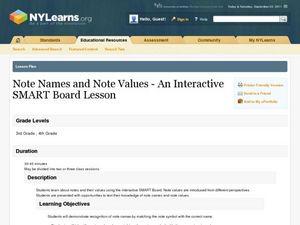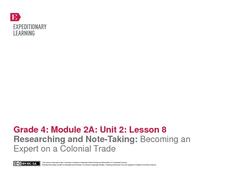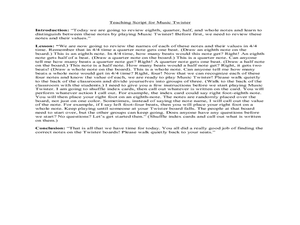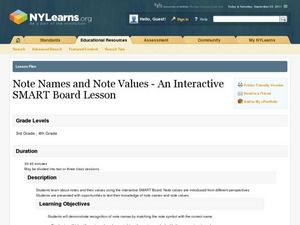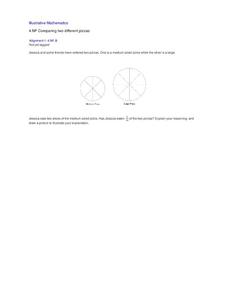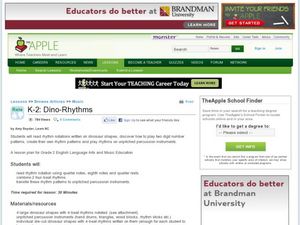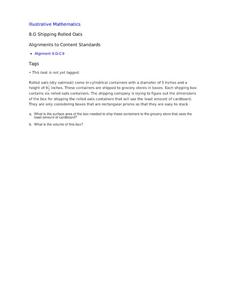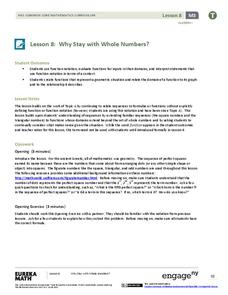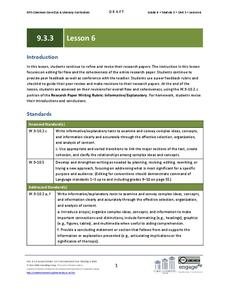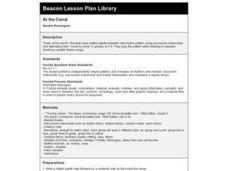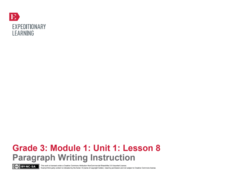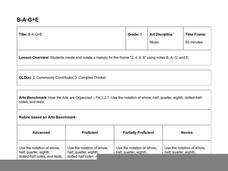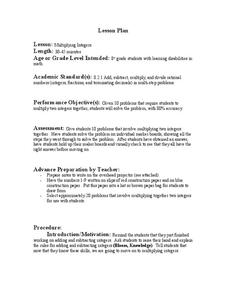Curated OER
Note Names and Note Values - An Interactive Smart Board Lesson
Using the Note Names and Values SMART notebook file, review the whole, half, quarter and eighth note with students. Students sing "Apple Tree Song." They add body percussion, and then instruments. Students use the SMART apple tree, they...
EngageNY
Researching and Note-Taking: Becoming an Expert on a Colonial Trade
Fourth graders work in small groups to become experts on different colonial trades in the eighth instructional activity of this unit. Working toward the long-term goal of writing a piece of historical fiction, young scholars read...
Curated OER
Kindergarten Music Lesson
Singing, clapping, moving up and down with the melody, it all sounds like a great music lesson. Kinder-musicians sing three different songs to practice memory, speaking, and movement skills. They'll move to the melody, build memory with...
Curated OER
You've Got Rhythm
Students study the rhythm value of a half note, quarter note, whole note, and eighth note. They stamp a rhythm pattern and create a clay animation which demonstrates note value.
Education Closet
Equal Rhythms
Engage young mathematicians in learning about fractions with this cross-curricular math and music lesson. After listening to and repeating different beat patterns, children realize that musical notes are just another way of representing...
Curated OER
Music Twister
Distinguish the sound of musical notes and correctly name them. In this music lesson, participate in a game of musical twister where the circles are renamed with musical note names. Additionally, display recognition of eighth, quarter,...
Curated OER
Note Names and Note Values-An Interactive SMART Board Lesson
Students discuss note names and symbols. For this music lesson, students identify note names and values. Students play a game using the SMART board in which they identify note names and values.
Illustrative Mathematics
Comparing Two Different Pizzas
What better way to learn about fractions than with a couple pizzas? Help Jessica figure out how much of the pizza she has eaten, while teaching your class that fractions refer to a specific whole amount. This problem will be challenging...
Curated OER
K-2: Dino-Rhythms
Second graders read rhythm notation and combine four-beat rhythms. In this rhythms lesson, 2nd graders read quarter notes, eighth notes, and quarter rests in rhythms that are written on dinosaur shapes. They clap, snap, or stamp out the...
Curated OER
Shipping Rolled Oats
What better way to start your day than with a box of oatmeal? Or what better way to start your geometry class than by calculating its volume? Eighth graders discover just how practical volume computation can be in business and in breakfast!
EngageNY
Why Stay with Whole Numbers?
Domain can be a tricky topic, especially when you relate it to context, but here is a lesson that provides concrete examples of discrete situations and those that are continuous. It also addresses where the input values should begin and...
EngageNY
Grade 9 ELA Module 3, Unit 3, Lesson 6
The eighth lesson in the editing process focuses on flow and cohesiveness in the entire research paper. Class members examine color-coded pre- and post-revision model paragraphs and then work in pairs to revise and peer-review their papers.
Curated OER
AT THE CORRAL
Middle schoolers study dotted eighth/sixteenth note rhythm pattern using percussion instruments and alternating from "corral to corral" in groups of 4-6. They play the pattern while listening to selected American western theme songs.
Curated OER
Teaching Rhythm and Pitch Reading
Students practice correct rhythms and pitches during this short lesson for the middle school instrumental class. Objectives vary depending on music used for the lesson. Students assessed through group playing in class.
EngageNY
Paragraph Writing Instruction
Writing a paragraph from details found directly in a text is the central focus of this thorough and explicit lesson plan. Using the stories Nasreen's Secret School and Rain School, third graders are lead step-by-step...
Hawaiʻi State Department of Education
B-A-G+E
Budding musicians discuss rhythmic notation and melody as they play a bar instrument or recorder. They use the notes B, A, G, and E to play a simple melody, and then they use those same four notes to turn a poem into a song. They...
Hawaiʻi State Department of Education
Rhythm Patterns
Fractions can be tricky. Why not have kids think of fractions like they think of eighth, quarter, and half notes? In teams, the class creates four-measure patterns with their percussion instruments. They need to explain their rhythm...
Curated OER
Jan Ken Pon
Fifth graders explore components of Japanese language, song, instruments, and music. Dotted eighth and sixteenth notes are practiced, the pronunciation of words for the song taught, and chords for tone chimes played in this lesson.
NOAA
Currents
Learn how ocean currents are vital to humans and marine life. The eighth installment of a 23-part NOAA Enrichment in Marine sciences and Oceanography (NEMO) program, focuses on ocean currents and how they affect global climate. The...
Curated OER
Showdown on the Frontier
Especially critical following a series of shootings in schools, theaters, and religious buildings, it's safe to say that we need to evaluate the current laws on gun control. Eighth graders read a New York Times article in order to better...
Teach Engineering
Superhydrophobicity – The Lotus Effect
Discover and demonstrate the Lotus Effect and superhydrophobic surfaces with the eighth installment of a nine-part series that teaches scholars about surfaces that exhibit superhydrophobicity. The lesson plan continues...
Dream of a Nation
Big6 Research Project
Do research projects at your school look like a class of eighth graders staring at a blank screen? Use the Big 6 research method to guide middle schoolers through the process of finding a topic, searching for and evaluating sources,...
Curated OER
Multiplying Integers
Seventh and eighth graders solve math problems where they multiply positive and negative integers. In this multiplication lesson plan, learners use slate boards to complete problems. The step-by-step plan tells you what to write and say...
Curated OER
Sight Reading Rhythm Patterns
Students demonstrate ability to sight read rhythms containing half, quarter and eighth notes and quarter rests; by clapping and chanting rhythms written on chart 1.
